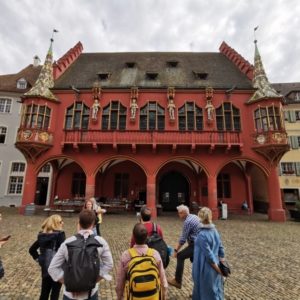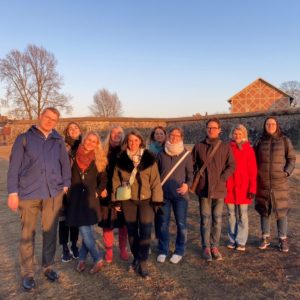Material
Project- and professionoriented etandems in Foreign Language Teacher Education
Information
Name of the institution(s) or teams
-
Université Côte d’Azur and University of Education Freiburg (PHFR)
-
Institute of German Studies/Nice and Institute of Romance Studies/Freiburg
Format
PDF and PowerPoint
Title
Project- and professionoriented etandems in Foreign Language Teacher Education.
Keywords
Virtual exchange, etandems, professionalisation, project-based learning
Topic
Various – virtual exchange on transcultural learning/digital learning
Goals
Originally, the objective was to “connect” students in France and Germany that were (thinking) about to study a bilingual teacher education program in a binational project work in the course of which they had the possibility to collaborate transnationally and to reflect individually on their perspectives of becoming a language teacher.
Gradually, the concept was further developed and opened for more target groups and phases of study; it was soon no longer a preparatory project for a binational program, but a virtual exchange approach which could connect courses between France and Germany (and beyond) through a common task-based course design and transnational project work (ideally followed by a “real mobility”, i.e. in the form of a student conference, as in the example below.
Thus, in general, the objective of the approach is to internationalize the curricula, to open thematic (subject-related, subject-related didactic or partially integrated) seminars for a transnational dialogue, to enable course participants to experience valuable changes of perspective and thus to deepen their intercultural communicative and methodological competencies.
Domains/aspects of internationalization (fill in the category from the grid)
Internationalisation of the curriculum, blended mobilities, virtual exchanges
Target group
Teacher education students, partly also associate schools
Educational level and study year
Bachelor/Master of Education
Context information users would need to understand the digital tool
(e.g., about the TE system, curricular integration)
The format was developed and piloted in 2016 in the context of the DFH/UFA-funded binational Teacher Education program “ITS”.
Language of the example
English
License
- Power Point/PDF with theoretical background: CC O
- Concept sketch with examples/fotos: Copyright
In how far does your approach strengthen the internationalization (of the curriculum) in Teacher Education?
As stated above, the approach addresses several dimensions of internationalization (of the curriculum), since it connects educators, students and, partly, also schools from Germany and France through blended collaborations that combine virtual/physical staff mobilities, virtual exchanges, transnational collaborations/project work.
Which dimensions of digital transformation in teaching for teacher educators did you incorporate (utilize)?
Firstly, the digital infrastructure is vital for the virtual exchange approach since it shaped the teaching and learning environment of the etandems. Just important, however, was the implication of the digital pedagogy used, mostly based in a virtually supported task-based-approach.
Besides, digital competencies were a) needed for the realization of the VE as well as b) themselves the topic of some cooperations. The competence framework used in this context was the DigiComEdu framework of Digital Competences of Teachers by the European Union.
How have you utilized digital tools/methods/resources in your teaching practice to strengthen coherent/integrative and/or international approaches, and what specific strategies or techniques have you found to be effective in achieving this objective?
See above.
How have you employed co-creative approaches and/or participatory design in your use of digital tools to enhance student learning and engagement, and what have been some of the successful outcomes that you have observed as a result?
Co-Creative approaches were applied in the design, implementation and evaluation of the course.
Download
Download
Download documents
(PDF, DOCX)
Download
Events: ConnEcTEd
Blog: ConnEcTEd
Es gibt derzeit noch keine Beiträge in dieser Kategorie.

Reisebericht: ConnEcTEd Project Meeting in Zagreb
Ein zentrales Anliegen der School of Education FACE ist die Entwicklung kohärenter – also strukturell und inhaltlich sinnhaft zusammenhängender – Curricula oder Module im Rahmen des Lehramtsstudiums. Was liegt da in Zeiten der Globalisierung näher, als sich anzusehen, wie dieses Prinzip in anderen Staaten und Bildungssystemen umgesetzt wird? Im Rahmen des Projekts ConnEcTEd geschieht genau das. Im September dieses Jahres reiste eine Freiburger Delegation nach Zagreb, um sich dort gemeinsam mit Projektpartner*innen aus Oslo, Nizza, Helsinki und Zagreb in Präsenz zu diesem wichtigen Thema auszutauschen.

Ins Bächle „dappen“, oder nicht? Treffen des ConnEcTEd-Teams in Freiburg
After the first in-person-meeting in March in Oslo, the ConnEcTED-Team met for the second time in Freiburg im Breisgau at the end of May. In the „Green City“ on the western edge of the Black Forest, right on the border to Switzerland and France, the project members reported on their work, discussed new tasks and further steps in the project, as well as forms of collaboration in different IOs.

Reisebericht: Das ConnEcTEd-Team in Oslo
Ein zentrales Anliegen der School of Education FACE ist die Entwicklung kohärenter – also strukturell und inhaltlich sinnhaft zusammenhängender – Curricula oder Module im Rahmen des Lehramtsstudiums. Was liegt da in Zeiten der Globalisierung näher, als sich anzusehen, wie dieses Prinzip in anderen Staaten und Bildungssystemen umgesetzt wird? Im Rahmen des Projekts ConnEcTEd geschieht genau das. Ende März dieses Jahres reiste eine Freiburger Delegation nach Oslo, um sich dort in Präsenz zu diesem wichtigen Thema auszutauschen.
Funding
This project receives funding from the Erasmus+ programme of the European Union (Strategic Partnerships, KA 203).
The contents of this website and the view expressed in the news and publications are the sole responsibility of the authors and under no circumstances can be regarded as reflecting the position of the European Union.




